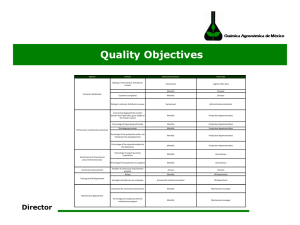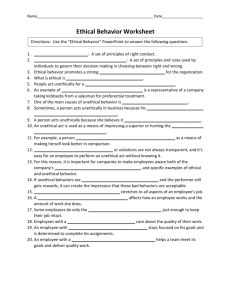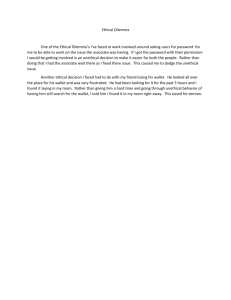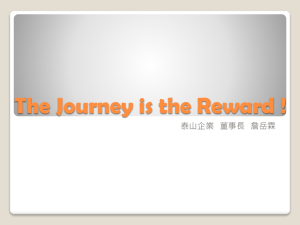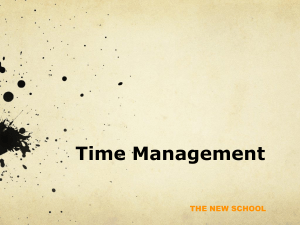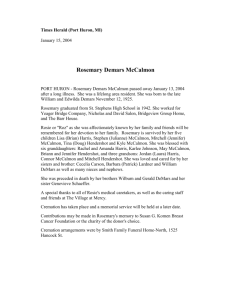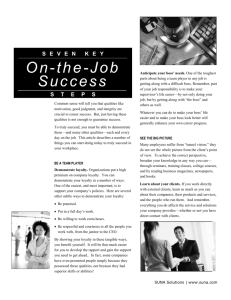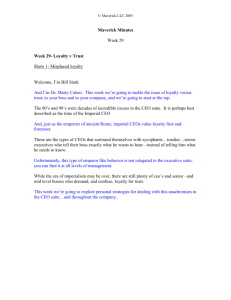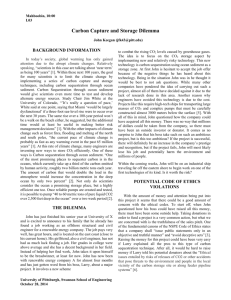The Washington Post
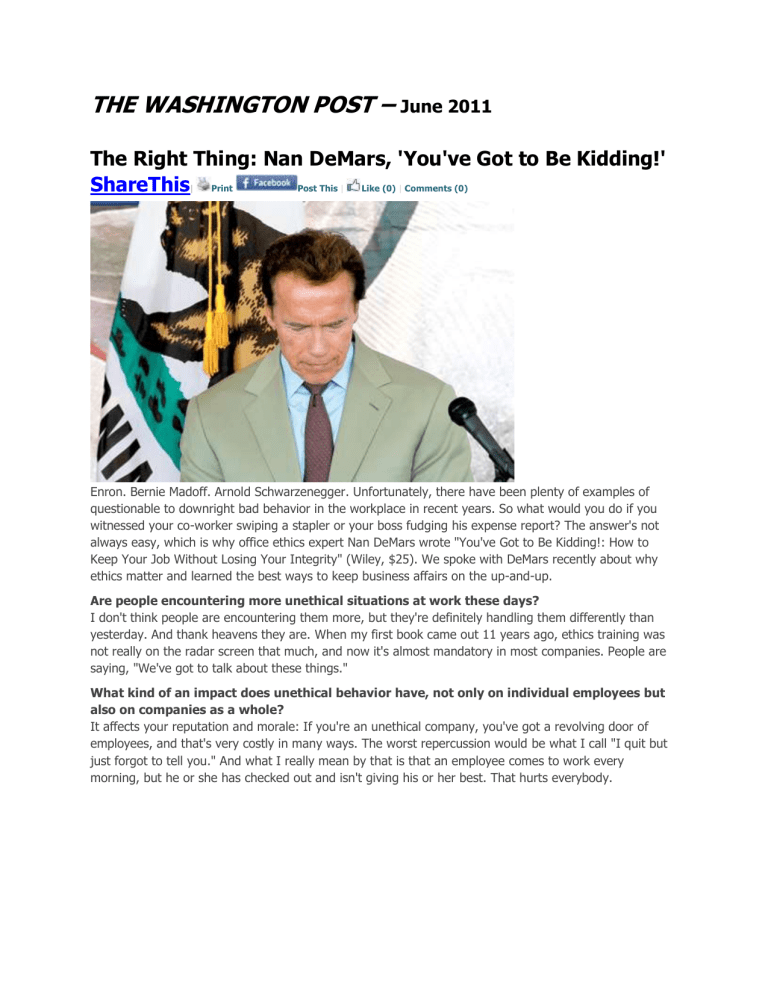
THE WASHINGTON POST –
June 2011
The Right Thing: Nan DeMars, 'You've Got to Be Kidding!'
ShareThis
| Print Post This | Like (0) | Comments (0)
Enron. Bernie Madoff. Arnold Schwarzenegger. Unfortunately, there have been plenty of examples of questionable to downright bad behavior in the workplace in recent years. So what would you do if you witnessed your co-worker swiping a stapler or your boss fudging his expense report? The answer's not always easy, which is why office ethics expert Nan DeMars wrote "You've Got to Be Kidding!: How to
Keep Your Job Without Losing Your Integrity" (Wiley, $25). We spoke with DeMars recently about why ethics matter and learned the best ways to keep business affairs on the up-and-up.
Are people encountering more unethical situations at work these days?
I don't think people are encountering them more, but they're definitely handling them differently than yesterday. And thank heavens they are. When my first book came out 11 years ago, ethics training was not really on the radar screen that much, and now it's almost mandatory in most companies. People are saying, "We've got to talk about these things."
What kind of an impact does unethical behavior have, not only on individual employees but
also on companies as a whole?
It affects your reputation and morale: If you're an unethical company, you've got a revolving door of employees, and that's very costly in many ways. The worst repercussion would be what I call "I quit but just forgot to tell you." And what I really mean by that is that an employee comes to work every morning, but he or she has checked out and isn't giving his or her best. That hurts everybody.
Can you be faced with an ethical dilemma on the job no matter what line of work you're in or position you
hold?
Whatever your job is, you can get caught in the middle. I was in Wyoming giving a seminar, and a group of coal miners came in and sat down in the front row. There was a break during the late morning, and one coal miner came up to me and said, "Ms. DeMars, I had no idea why the president of our company said we should all come to your seminar. But at about 10 o'clock this morning, you hit exactly on my issue."
And he had tears in his eyes. Everybody deals with ethical dilemmas, even in the bowels of the mountains in Wyoming.
It's a reality.
How has personal accountability become more
important these days?
My best advice to people would be to follow my Ethical
Priority Compass, which is really my signature idea. And the
No. 1 element of that is to take care of yourself, because nobody else is going to take care of you today. The idea that your company or boss will take of you, that doesn't work today. You have to protect your professional reputation, your financial security. You cannot any longer use those cop-out words, "My boss told me to do it." They're not going to save you.
And how has the concept of loyalty on the job changed?
The number-two element of the Ethical Priority Compass is to take care of your company. But it's no longer the blind loyalty of yesterday. Those days are totally, totally gone.
In fact, you advocate taking care of yourself first, then your company and then your boss.
A professional relationship merits a lot of loyalty and performance, but it cannot be blind, unconditional loyalty. Supervisors have a lot of power, but you have some power, too. People think it's not their job to police their boss. Well, yeah, it is. If you can keep your boss out of trouble, you can keep yourself out of trouble and the company out of trouble. You do have to step up to the plate and say, "We have a problem here." Bosses today are embracing this. They're opening up the doors and saying, "Let's talk." I work with companies around the world, and they're hiring me because they care about an ethical workplace. They want to keep everything on track and make sure their employees understand that kind of accountability.
Do you handle things differently when it's a peer who's doing something ethically
questionable versus when it's your boss?
The bottom line is no, it's not that different. In both cases, you can open the discussion by saying, "Can we talk about something that's been bothering me?" I love the word "uncomfortable"; it's not threatening. Say, "I'm uncomfortable with something and I wish to talk about it." And the word
"accountable" — that's going to be your best defense. If it's a discussion of something you can't do or don't want to get involved in, your best defense is to say, "Someday I may have to be held accountable here."
Let's say you screw up on the job. What do you do next?
You've got to admit it. The cover-ups are always the worst. Just come out and say, "Yes, I screwed up."
It's so much better to just admit it completely from the very, very beginning. Everybody screws up. Then assess the problem to find out why you did it. Take a deep breath; the sky might be falling, but it's not going to be the end of the world. Then forgive yourself; quit beating yourself up. Apologize to the right people, then make sure you've set up all kinds of different ways so this will never happen again.
You heard about a lot of unethical behavior while writing this book. Does anything still
surprise you?
I keep saying I've heard it all, then something comes up on the next trip and I realize I was wrong. I don't think you can say you've heard it all.
Written by Express contributor Beth Luberecki
Photo by Justin Sullivan/Getty Images
Posted By Express at 1:48 PM on June 13, 2011 Tagged in Books , Getting Ahead

